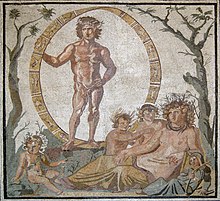Tellus


Tellus ( Latin "earth") is the deity of the maternal earth in Roman mythology , therefore often called Terra Mater , and corresponds to the Greek Gaia .
They were called in the event of an earthquake (the building of their temple in Rome , on the slope of the noble quarter of the Carinae , had been praised in the war against the Picenians in 268 BC after an earthquake), in solemn oaths together with the sky god Jupiter , as the common grave of things next to the manes .
Like the Greek Demeter , she was also considered the goddess of the order of marriage, but in particular she was worshiped in connection with Ceres as the goddess of fertility. So you were in January at the conclusion of the winter sowing the pontiff scheduled for two consecutive market days Saatfeier ( feriae sementivae ) and simultaneously celebrated in the country Paganalien where it was sacrificed a pregnant pig with Ceres, as well as at April 15 for the fertility of the year, celebrated partly on the Capitol, partly in the 30 Curiae , partly outside the city with the participation of the Pontifices and the Vestals , of the Fordicidia or Hordicidia, at which pregnant cows ( fordae ) were sacrificed to her . The ashes of the unborn calves were kept by the Vestal Virgins until the feast of Parilia , when it was mixed with the ashes of the "October horse" and used as a detergent ( suffimen ).
In addition to the female deity, a god Tellumo was also worshiped .
The chemical element tellurium was named after Tellus in 1798 by Martin Heinrich Klaproth .
literature
- C. Robert Phillips: Tellus. In: The New Pauly (DNP). Volume 12, Metzler, Stuttgart 2002, ISBN 3-476-01470-3 , Sp. 100-102.
- Georg Wissowa : Tellus . In: Wilhelm Heinrich Roscher (Hrsg.): Detailed lexicon of Greek and Roman mythology . Volume 5, Leipzig 1924, Col. 331-345 ( digitized version ).